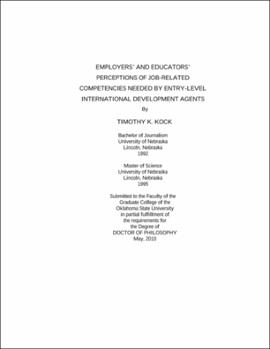| dc.contributor.advisor | Weeks, William | |
| dc.contributor.author | Kock, Timothy K. | |
| dc.date.accessioned | 2013-11-26T08:22:20Z | |
| dc.date.available | 2013-11-26T08:22:20Z | |
| dc.date.issued | 2010-05 | |
| dc.identifier.uri | https://hdl.handle.net/11244/6563 | |
| dc.description.abstract | Scope and Method of Study: The purpose of this study was to determine employees (NGOs) and educators (AIAEE members) perceptions of job-related competencies for entry-level international development agents. Nine constructs were garnered from research, conflict management and resolution, cultural diversity, , management responsibility, personal and professional development, personal skills, program planning and evaluation, public relations, staff relations, and work habits. The populations included 90 NGO employees, and 178 members of AIAEE. Both populations were surveyed using an online questionnaire. This descriptive study generated a 36% response rate for NGO employees, and 49% for AIAEE members. | |
| dc.description.abstract | Findings and Conclusions: Both populations rated all nine constructs as somewhat important or important. However, when asked to rank the constructs in order of importance, the NGO population ranked work habits as most important, followed by personal skills, and management responsibility. Whereas, the AIAEE population ranked program planning and evaluation as most important followed by cultural diversity, and work habits. However, only a weak correlational relationship was evident for age and international work experience to the nine constructs. Pertaining to the demographics of the populations, the NGO contained a larger percentage of females than did the AIAEE population. Both populations indicated they culturally identify with the western culture, however both populations indicated they have worked throughout the world. The largest number of respondents indicated they had worked in Asia, Africa, North America, or the Middle East. However, AIAEE members had more years of experience in their current positions, but NGO employees had more years of experience residing in a foreign country. When AIAEE members were asked how many undergraduate or graduate courses they taught that prepare students for employment in international development, almost half taught no courses. However, qualitative data gathered from a telephone interview of an international recruiter indicated that students today are better prepared than those five years ago. | |
| dc.format | application/pdf | |
| dc.language | en_US | |
| dc.rights | Copyright is held by the author who has granted the Oklahoma State University Library the non-exclusive right to share this material in its institutional repository. Contact Digital Library Services at lib-dls@okstate.edu or 405-744-9161 for the permission policy on the use, reproduction or distribution of this material. | |
| dc.title | Employers' and educators' perceptions of job-related competencies needed by entry-level international development agents | |
| dc.contributor.committeeMember | Kelsey, Kathleen D. | |
| dc.contributor.committeeMember | Sitton, Shelly | |
| dc.contributor.committeeMember | Raun, William | |
| osu.filename | Kock_okstate_0664D_10914.pdf | |
| osu.accesstype | Open Access | |
| dc.type.genre | Dissertation | |
| dc.type.material | Text | |
| dc.subject.keywords | encies | |
| dc.subject.keywords | educators | |
| dc.subject.keywords | employers | |
| dc.subject.keywords | entry-level | |
| thesis.degree.discipline | Agricultural Education | |
| thesis.degree.grantor | Oklahoma State University | |
